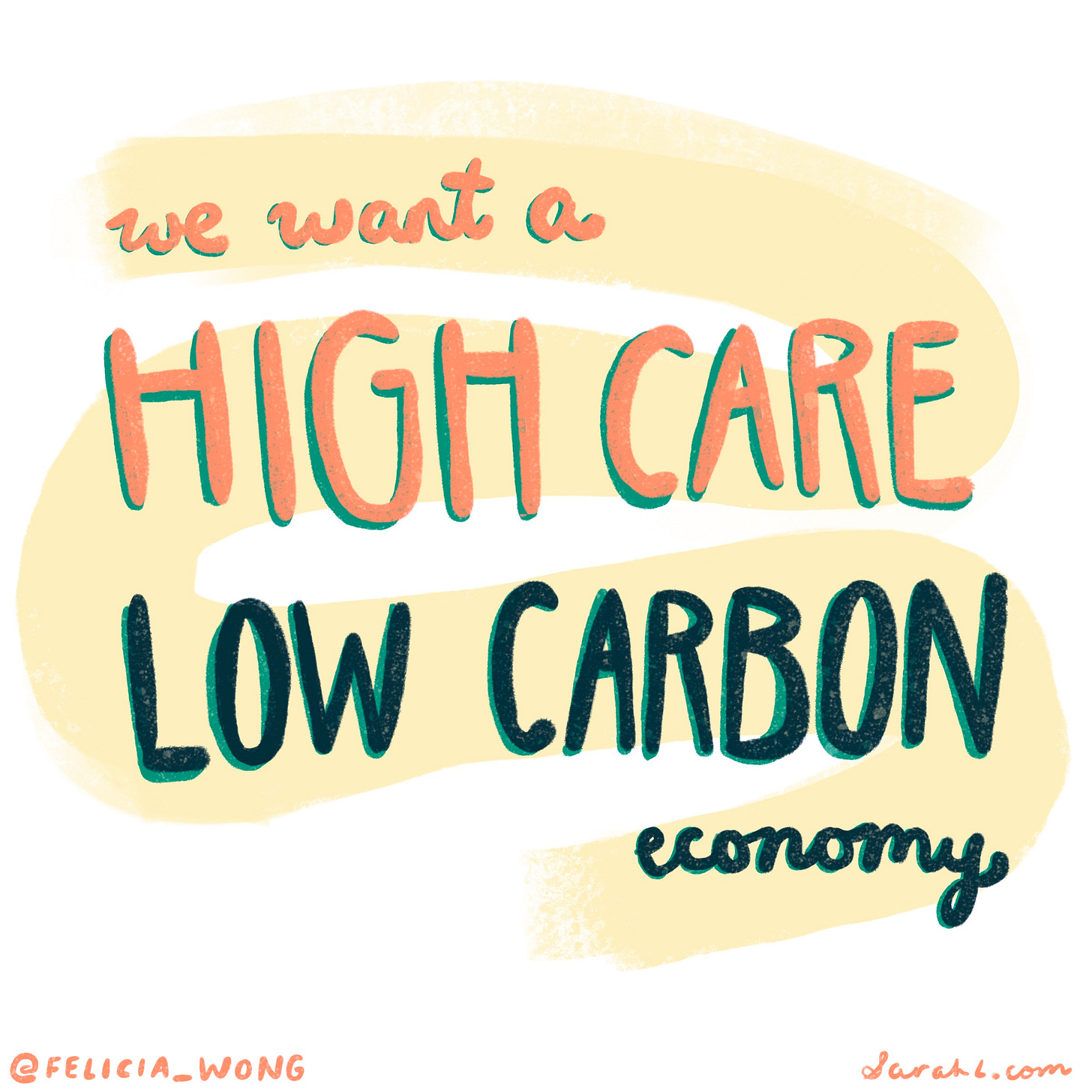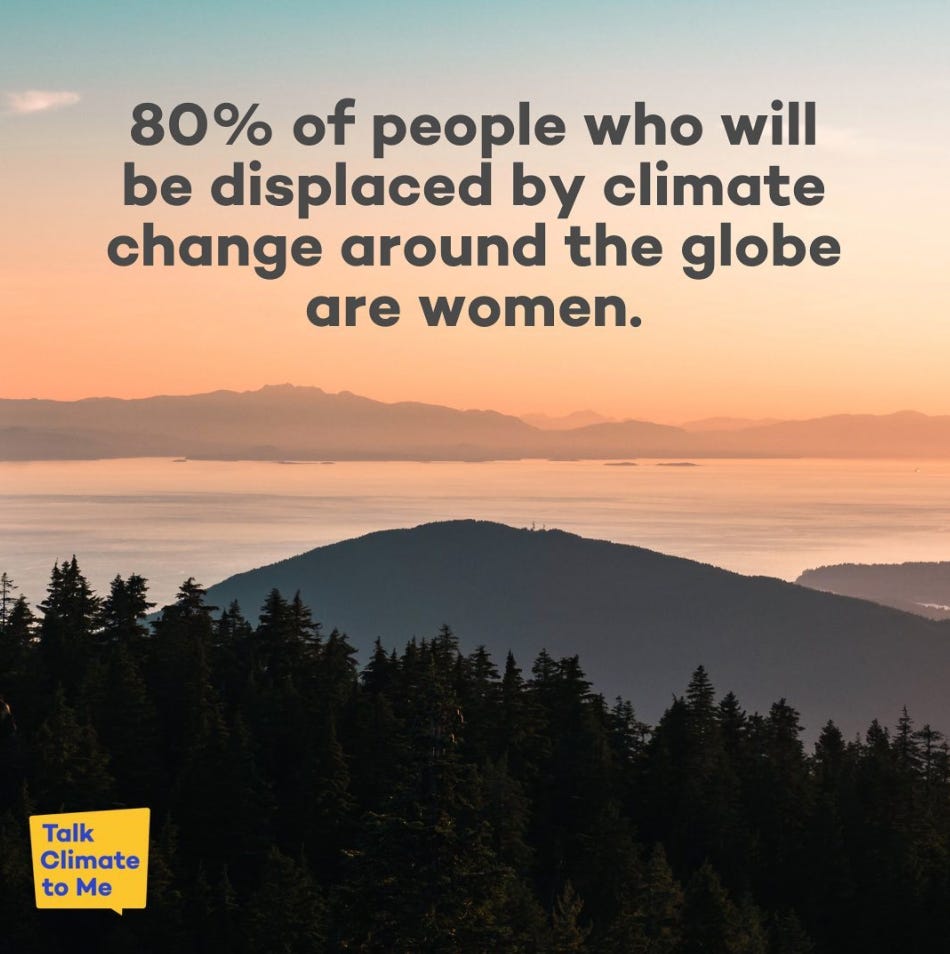Five Frabjous Fraught-starters for Fall!
A fractured and fragmentary frappé of frings
I feel like a fluffy flibbertigibbet these days, so consider this the short-attention span sampler edition of MVP. Here are a few little and big things on my broken mind.
1. High Care Low Carbon Love
At an election meeting with some fellow climate orgs a few weeks ago I played the role of green grouch. There was some suggestion that our upcoming federal election would be all about justice and fairness and compassion. I would love for that to be the case, but I spend too much time reading Facebook comments (don’t!) to harbour any belief that voters would be motivated by justice. And with a few weeks to go, and populism surging, I fear I’m right.
Last week I heard Felicia Wong on the Ezra Klein show. She summarized Joe Biden’s plan for America thus: We want a High Care Low Carbon economy. It’s so beautiful. So simple. But do those words translate to something people can vote for? I’m not sure. I’ve taken to thinking of our current federal election mindset here in Canada as protect your core. When people feel threatened, they huddle up and tighten their abs, even if, when at ease, they very much care about things that are high care and low carbon and low carb. It’s just that you can’t devote attention to those things when your core feels vulnerable. And with COVID, housing unaffordability, and myriad other fears jockeying for top berth, attention is going to the gut. It’s literal protectionism.
The key is to remember that even when climate is a key voting issue (and it is, according to current polling!) it isn’t a primal voting issue. Putting too much stock in climate concern will result in massive disappointment on election days. Again, not because people don’t care, but because a loaf of bread is a thing you can need more immediately and palpably than a building retrofit. This just means we need to design a world where people can have their bread and green it too.
2. Fake Norms Can Lose
More people are climate concerned than not. More people want to take action than don’t. And that trend is increasing by the millisecond. Which is why climate headlines that don’t emphasize these norms are bogus. To wit, this Globe and Mail fail.
As a journalistic outlet, you could say that objectivity should be the overriding goal, and that both a headline highlighting the negatives or the positives would be fair in the case of this data. But if the goal of journalism is to share relevant information, the relevant information here is that the majority preference for climate action is growing with every poll. Which is why highlighting a persistent but unchanging minority opinion just seems like bad journalism. As the climate-concerned, it’s our job to call this in when we see it because descriptive norms are wildly powerful.
In the most famous behavioural science example, the Petrified Wood Principle, Robert Cialdini illustrated how amplifying bad behaviour encourages people to behave accordingly. Telling people that far too many people had taken treasures from the petrified forest actually encouraged more people to steal wood. Despite the fact that this is not normative behaviour and most people don’t steal. In other words, highlighting something amplifies its normative power. Which is why stressing that some people still don’t care about climate change is just stupidly unhelpful.
(The cool thing is a few tweets was all it took for the Globe to rewrite their headline!!)
3. Climate Anxiety: New Words for a New World
This piece on the language of climate anxiety in Yes! is so good. It talks about how the term climate anxiety is both amorphous and very white. Climate anxiety in this context is about sadness, when for many people, especially those at the forefront of climate effects in other parts of the world, climate anxiety is about anger.
Experts in a variety of fields, from science communication to the health effects of climate change, argue that this buzzword misses the complexity of the phenomenon. By painting the psychological experience of climate change in such broad strokes, it inevitably excludes marginalized voices. Instead, they’re calling for a more nuanced discussion of climate change and mental health—one that decenters the experiences of white, wealthy communities.
“It’s actually just a perpetuation of colonialism,” Barnwell says. “By individualizing distress, we miss what is politically happening around the world to various communities.”
I love the new lexicon proposed by Australian professor Glenn Albrecht in his forthcoming book. Words like “tierrafurie,” the extreme anger one feels at the destruction wrought by an industrial-technological society. Albrecht also coined solastalgia, a word I’ve long loved, which describes the feeling of love and distress we feel at the experience of climate-changed landscapes.
4. I Don’t Really Have a Four, But Lists Need to Come in Threes or Fives, So Here’s a Doodle of a Deconstructed Watermelon
5. The Carbon Coffee Klatch
I practice lots, and still I royally eff up 53% of all climate conversations I have (Hello, telling my brother-in-law that his fancy artisanal meat from a swish Montreal butcher still didn’t reflect the social cost of carbon. Why?). Like Chopin, carbon convos require a delicate touch, a romantic disposition, and hours of practice. When we come together to talk climate, there’s an added benefit: release. At climate cafés popping up around the world, people chat, grieve, and imbibe. From The Guardian:
Kilmer said she was astonished by how good she felt at the end of the first climate cafe she attended. “Even though I had shed a lot of tears, and gotten in touch with some powerful feelings, there was a sense of relief that I could share that with somebody,” she said.
Indeed. We’re afraid to talk. But talking unlocks so much. And makes us better talkers. This is the impetus for two initiatives that I hope are worthy of your time:
Talk Climate to Me
Our collaborative climate course is now open for registration. It’s an online experience for women-identifying people in Ontario (though no one will be turned away!). We promise a joyful series of talks and creative exercises to help you gain confidence and find climate community. You can sign up as an individual or as a team.
Carbon Conversations
This October, Carbon Conversations TO will be hosting an online training to help you talk about climate! Our Climate Action Facilitator Training will help build your capacity as a group facilitator and a community climate leader. During the training, you will join a small group of 6-12 participants to learn about the psychology of climate change and behaviour change. You will practice group facilitation skills and learn how to host your own Carbon Conversations program. This unique training is interactive, engaging and fun. Applications are due September 25.
This week:
What’s up? Are you focused or fractured? Got a climate neologism? Had a good or horrid climate convo? As always, let me know!
Last week:
I got so much feedback. Turns out being a judgy grump is a leeetle bit relatable, ha. Lots of wisdom, thank you thank you! Love this bit of behavioural science on how we are not the best judges of others’ judgment. Thanks Nathan!
In terms of what people actually hate in terms of preachiness, I thought this little piece was pretty amazing - it found that religious people (obvious parallel with climate activists?) tend to assume non-religious people will hate them praying in public and be grateful to be told about their religion or invited to pray together, when actually it’s completely the reverse … At the very least, we aren’t the first group who’s had an unpopular message we think would save everyone. Maybe we just have to own our culty weirdness, maybe with more public “praying” at the margins?
PEOPLE DANCING
Beegees50centendofsummervibezyespls!
Thanks so much for reading. If you like MVP, please subscribe or share. If you hate it, let me know so I can make it better. Hope you are healthy and happy and safe.
Have a lovely weekend,
Sarah











Re: Five Frabjous Fraught-starters for Fall! A fractured and fragmentary frappé of frings
Flabbergasted!
Thanks for spotlighting corporate media framing positives as negatives. It brings to mind FAIR.org — Fairness and Accuracy in Reporting — solid, relentless criticism for this tactic and many other mainstream media mind-games.